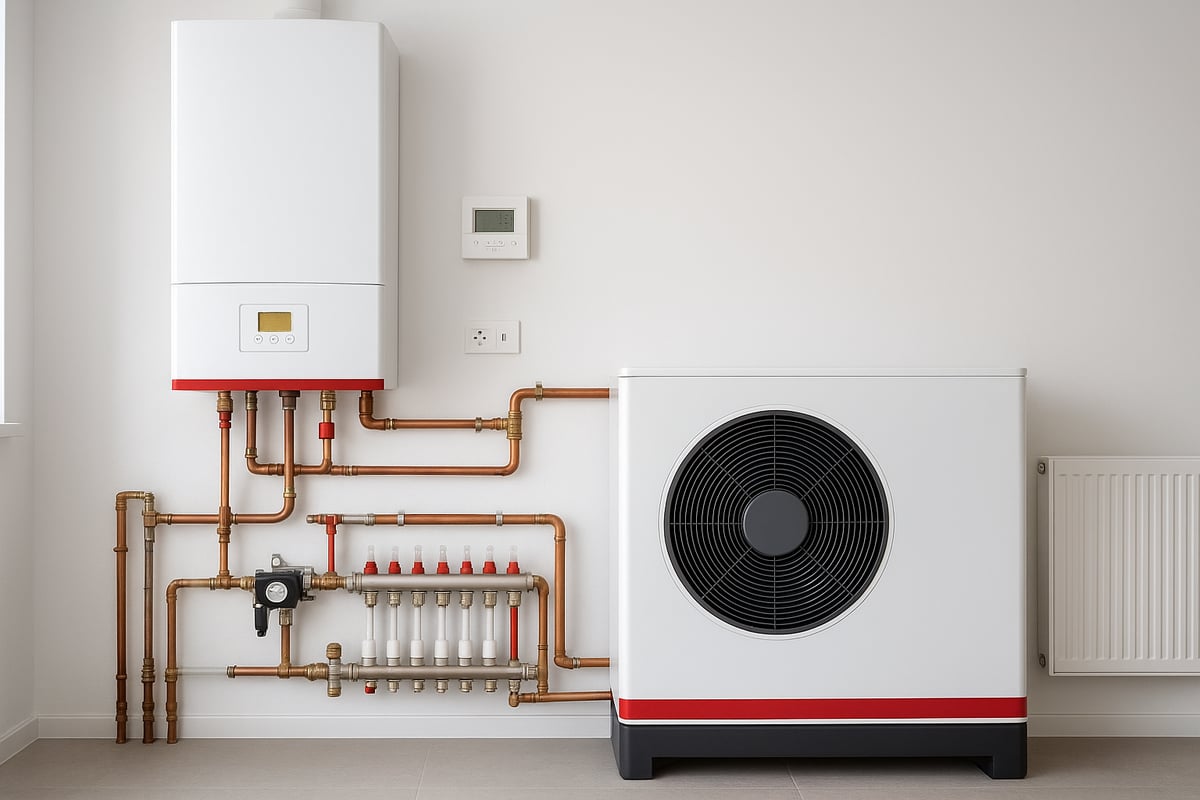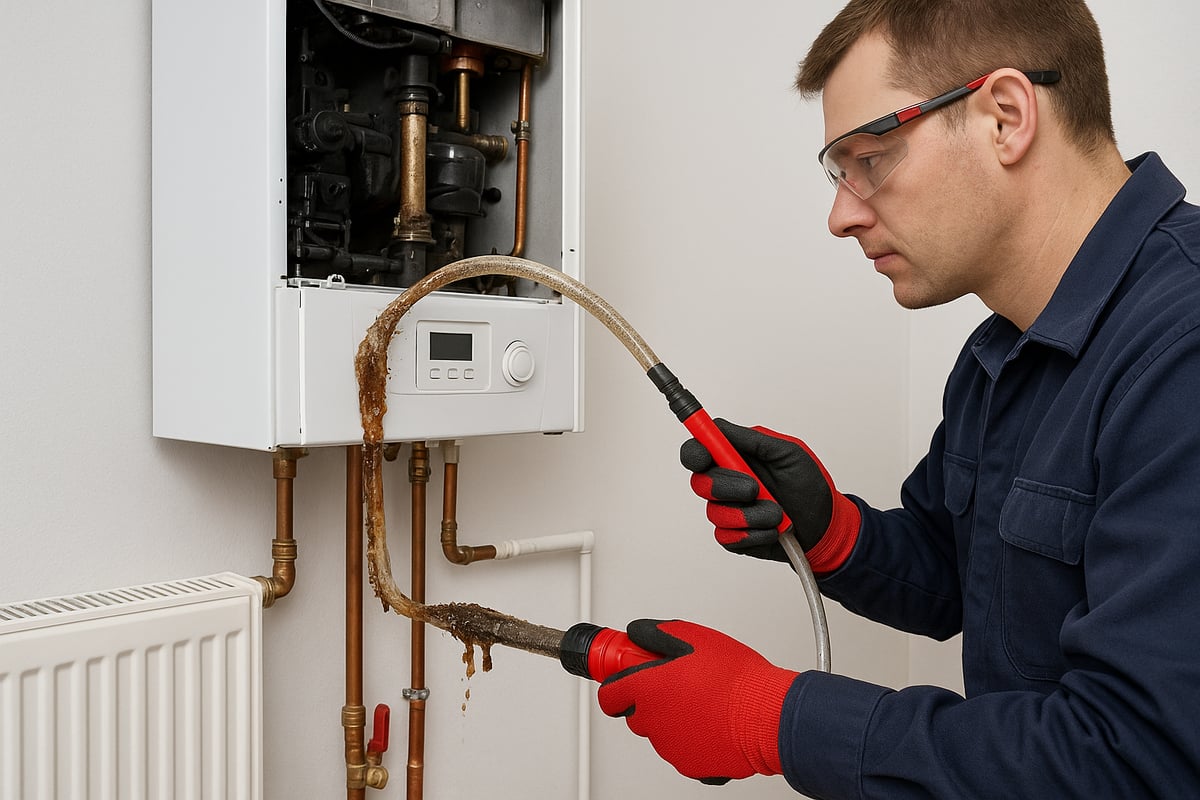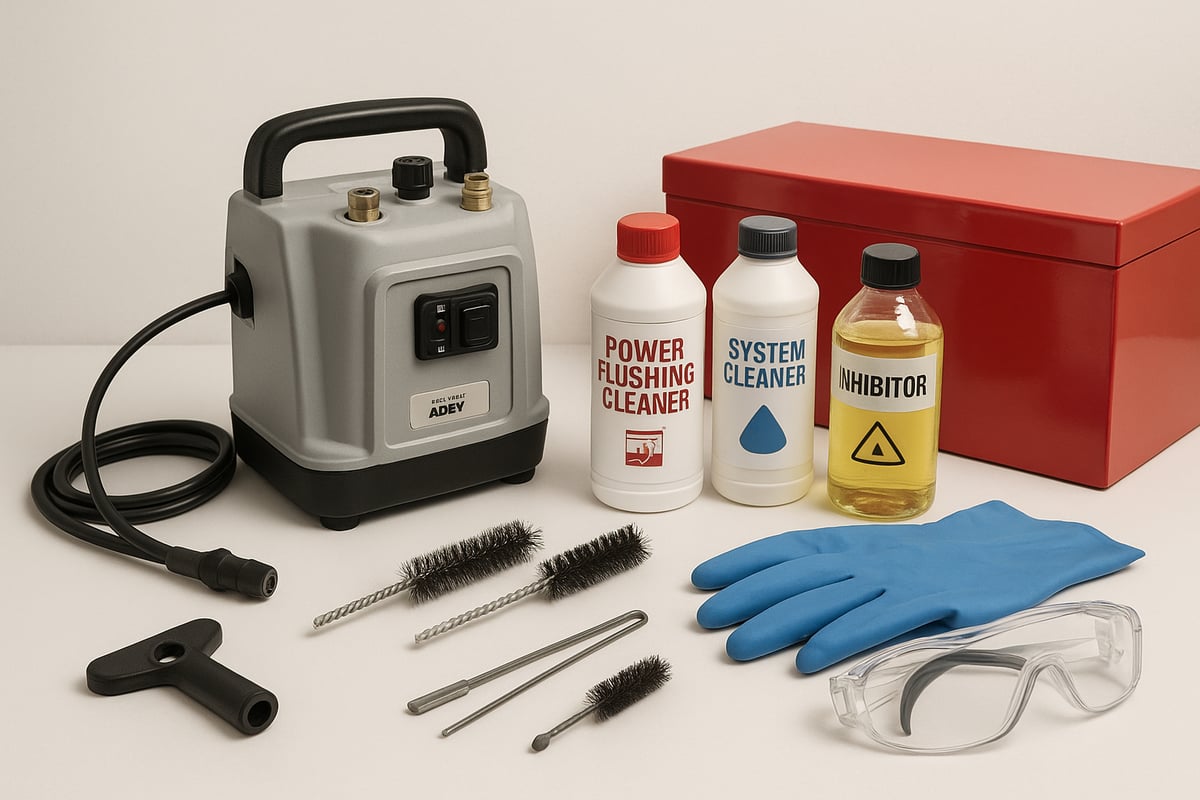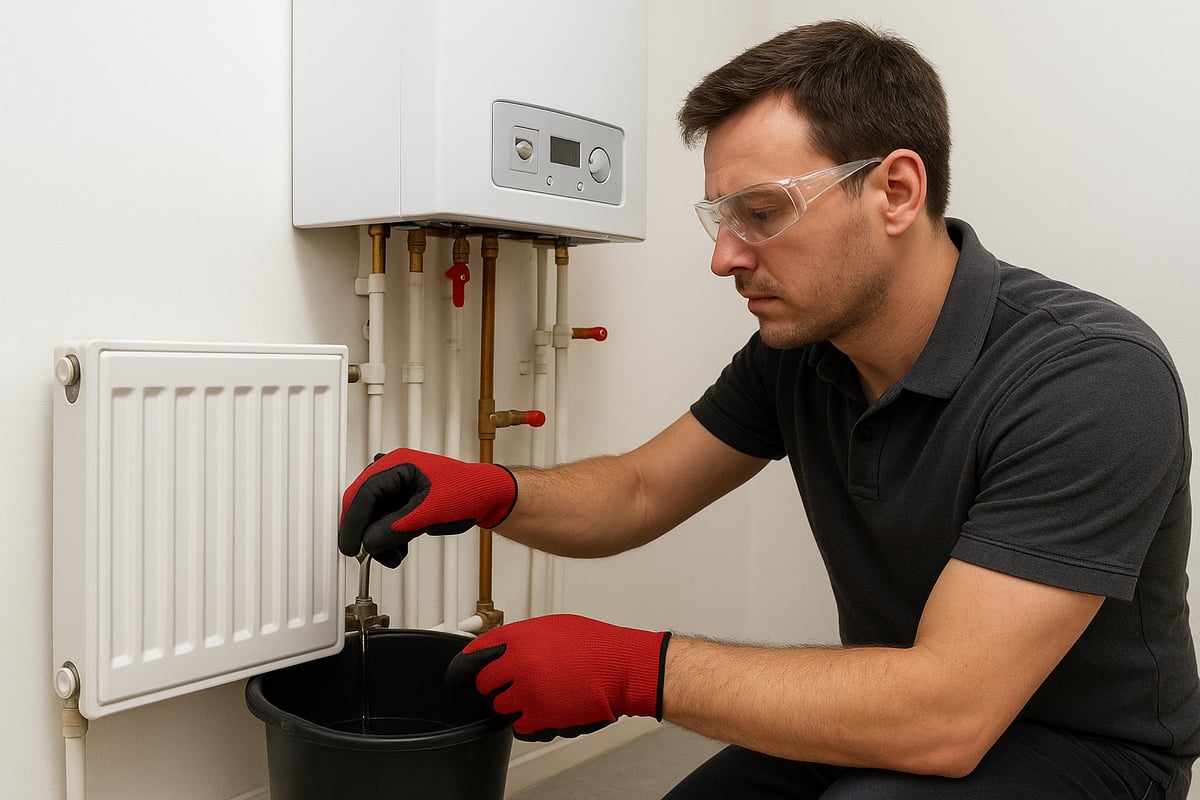Heating System Cleaning Guide: Expert Insights for 2025
Rising energy costs in 2025 mean that UK homeowners need to ensure their heating systems are running as efficiently as possible. Heating system cleaning is a crucial step that not only helps to reduce energy bills, but also extends the lifespan of your equipment and improves indoor air quality.
A well-maintained system provides consistent warmth, helps you avoid costly repairs, and creates a healthier home environment. In this comprehensive guide, you will find expert-backed, actionable advice tailored to UK homes and the latest heating technologies.
Follow this step-by-step resource to keep your heating system in peak condition throughout the year. We will cover everything from understanding your system, the benefits of regular cleaning, essential tools and safety, a detailed cleaning process, ongoing maintenance, and when to call in a professional.
Understanding Modern Heating Systems in 2025
Modern UK homes feature a diverse range of heating systems, each with unique cleaning requirements. As technology advances and regulations tighten, understanding your system’s specific needs is essential for effective heating system cleaning. Let’s explore the types of systems, components most prone to dirt, the impact of build-up, warning signs, and the latest innovations shaping home heating in 2025.

Types of Heating Systems in UK Homes
In 2025, UK homes rely on a blend of traditional and modern systems. The most common types include:
- Central heating with gas boilers (over 60% of homes)
- Combination (combi) boilers, which provide heating and hot water without a separate cylinder
- Heat pumps, now found in 15% of properties, offering efficient electric heating
- Underfloor heating, popular in new builds and renovations
Each system has distinct heating system cleaning needs. Gas boilers and combi units often require flushing to remove sludge, while heat pumps need filter and coil cleaning. Underfloor heating systems can develop hidden build-up in long pipe runs. For example, heat pumps differ from boilers by demanding regular attention to their heat exchangers and filters. The latest housing data confirms that gas boilers still dominate, but heat pumps are rapidly gaining ground as the UK pushes towards net zero.
Key Components Prone to Dirt and Build-up
The most vulnerable parts of any heating system are:
- Radiators and underfloor heating pipes
- Boiler heat exchangers
- Circulator pumps and valves
These components often accumulate sludge, limescale, or debris, which impairs performance. Picture your system as a network: radiators at the endpoints, pipes connecting everything, the boiler or heat pump at the core. Sludge tends to settle at the base of radiators, while limescale forms on heat exchanger surfaces. Debris can clog pumps, leading to circulation issues.
For a deep clean, methods like Powerflushing for heating systems are highly effective at removing stubborn deposits from these critical components. Regular attention to these areas is a cornerstone of successful heating system cleaning.
How Dirt Impacts System Efficiency
Ignoring heating system cleaning can significantly reduce efficiency. Even a thin layer of limescale, just 1mm thick, can lower boiler performance by up to 10%. This means more energy is needed to achieve the same comfort, pushing up your bills.
Sludge and debris restrict water flow, causing uneven heat distribution. Over time, this extra strain increases the risk of breakdowns and costly repairs. Keeping internal components clean is vital to maintaining energy efficiency and system reliability.
Signs Your Heating System Needs Cleaning
How do you spot when heating system cleaning is overdue? Watch for these tell-tale symptoms:
- Cold spots on radiators, especially at the bottom
- Gurgling, banging, or hissing noises from pipes or the boiler
- Slower heating up times
- Unexplained increases in energy bills
Visual cues like discoloured water when bleeding radiators, or a noticeable drop in system pressure, also signal the need for cleaning. Addressing these early helps prevent major issues.
Latest Innovations in Heating System Design
The future of heating system cleaning is shaped by new technologies. Many modern boilers and heat pumps now feature smart controls and self-diagnostic tools. These automatically alert homeowners to maintenance needs, making upkeep far simpler.
Advanced materials and anti-limescale coatings are also reducing the rate of internal build-up. As a result, today’s systems are not only more efficient but also easier to care for, ensuring consistent performance and longer lifespans.
Why Regular Heating System Cleaning Matters
Keeping your heating system clean is more important than ever in 2025. With rising energy prices and stricter efficiency standards, regular maintenance is not just about comfort, but about protecting your wallet and the environment. Let us explore the core reasons why heating system cleaning should be part of every UK homeowner’s routine.

Energy Efficiency and Cost Savings
Heating system cleaning is the foundation of energy efficiency. When your system is free of sludge and limescale, it does not have to work as hard to heat your home. This can lead to savings of £100 to £300 per year, according to the Energy Saving Trust.
A well-maintained system uses less fuel and reduces wear on key components. In fact, recent ECO4 statistics show that homes with regular heating system cleaning and upgrades achieve consistently lower energy bills. This means more money stays in your pocket, and your system runs smoothly year after year.
Improved Indoor Air Quality
A clean heating system means cleaner air circulating throughout your home. Dust, allergens, and bacteria often build up in neglected systems, then spread into living spaces.
Heating system cleaning helps remove these particles, creating a healthier environment, especially for those with allergies or respiratory conditions. Improved air quality leads to fewer health complaints and a more comfortable home.
Extending Equipment Lifespan
Regular heating system cleaning reduces the strain on boilers, pumps, and radiators. When internal components are free from debris and limescale, they operate more efficiently and with less risk of damage.
This simple routine can add three to five years to the life of your heating equipment. Over time, this translates to significant savings by delaying the need for costly replacements.
Preventing Costly Breakdowns
Neglecting heating system cleaning can lead to blockages and reduced performance. Minor issues, if left unaddressed, often develop into major faults that require expensive repairs.
Routine cleaning allows early detection of problems, helping you avoid emergency callouts. The average repair cost for neglected systems ranges from £250 to £600, so preventative maintenance is always the wiser choice.
Compliance with Manufacturer Warranties
Many boiler and heating system warranties require evidence of regular cleaning and servicing. Without this, you could void your warranty and lose valuable protection.
Brands like Baxi and Worcester Bosch specify maintenance schedules in their manuals. Keeping records of heating system cleaning ensures you remain compliant and covered in case of future issues.
Environmental Impact
Heating system cleaning has a direct impact on your carbon footprint. Efficient systems use less energy, which reduces greenhouse gas emissions.
This supports the UK's commitment to net-zero homes by 2050. By maintaining your system, you are not only saving money but also contributing to a cleaner, greener future for everyone.
Essential Tools, Products, and Safety Precautions
A successful heating system cleaning project relies on having the right tools, products, and safety measures in place. Before you begin, make sure you are fully prepared to protect both your home and your equipment, ensuring efficiency and peace of mind throughout the process.

Must-Have Tools and Cleaning Products
Gathering the proper tools makes heating system cleaning smoother and more effective. Essential items include a powerflushing machine, radiator key, sturdy brushes, chemical cleaners, and personal protective equipment such as gloves and goggles. For eco-conscious homeowners, choose environmentally friendly cleaning solutions and biodegradable inhibitors.
A powerflushing machine is vital for deep cleaning. It circulates water and cleaning agents at high velocity to dislodge stubborn sludge and debris. For a modern approach, consider following a Magna Cleanse system flushing guide to maximise cleaning efficiency and protect your investment. Always check that your products are compatible with your specific heating system cleaning needs.
Safety First: Protecting Yourself and Your Home
Safety is paramount during heating system cleaning. Always switch off the power supply and let the system cool before starting any work. Wear gloves and goggles to shield your hands and eyes from chemicals and sharp edges. Ensure the area is well ventilated to avoid inhaling fumes.
Take extra care when handling heated components. Even after switching off, radiators and pipes may remain hot for some time. Always work methodically and keep your workspace organised to prevent accidents.
Handling Chemicals and Waste Responsibly
Proper disposal is a key part of heating system cleaning. Used chemicals and sludge must never go down household drains. Collect all waste in suitable containers and consult your local council for guidance on disposing of hazardous materials.
Never mix different cleaning products, as this can create dangerous reactions. Always read product labels and follow instructions for safe use and disposal. Protecting the environment is as important as maintaining your heating system.
Understanding Your System’s Manual
Before starting heating system cleaning, refer to your system’s manual for manufacturer-specific advice. Procedures can differ between combi and system boilers, especially when it comes to draining or refilling.
Pay attention to recommended cleaning products and intervals. Following these guidelines preserves your warranty and ensures your cleaning process is both safe and effective. If you are unsure, consult the manual or manufacturer’s helpline for clarification.
When to Call a Professional
Some aspects of heating system cleaning are best left to qualified professionals. If you have a complex system, encounter persistent issues, or lack confidence, it is safer to call a Gas Safe or OFTEC registered engineer.
Professionals have the training and equipment to handle advanced cleaning, diagnose faults, and ensure compliance with UK safety standards. Do not hesitate to seek their expertise if your heating system cleaning reveals unexpected problems or if you want guaranteed results.
Step-by-Step Heating System Cleaning Process
Regular heating system cleaning is essential for maintaining efficiency, reducing costs, and preventing unexpected breakdowns. By following a structured process, you can ensure your home's heating remains reliable and effective throughout the year.

Preparation and System Shutdown
Begin every heating system cleaning by prioritising safety and preparation. Switch off the central heating at the main control panel and isolate the power supply to avoid electrical hazards. Allow the system time to cool completely, which prevents burns and ensures safe handling of components.
Gather all necessary tools and equipment in advance. This typically includes a powerflushing machine, radiator key, chemical cleaning agents, protective gloves, goggles, and a sturdy bucket. Have absorbent cloths on hand to catch drips and protect flooring.
Check your system's manual for manufacturer-specific instructions before starting. Careful preparation reduces the risk of damage and ensures a smooth heating system cleaning process.
Draining the System
The next step in heating system cleaning is to drain the entire system. Locate the main drain valve, usually found at the lowest point of the pipework, and attach a hose or position a bucket beneath. Open the valve carefully to allow water, sludge, and debris to flow out.
Be patient, as draining can take several minutes depending on system size. Once the flow slows, move along the radiators, opening bleed valves with a radiator key to release trapped air and facilitate complete drainage.
Dispose of wastewater and sludge responsibly, in accordance with local regulations. This step is crucial for a thorough heating system cleaning and prevents contaminants from remaining within the pipework.
Cleaning Radiators and Pipes
With the system drained, focus on cleaning radiators and pipes to remove internal build-up. For stubborn blockages, you may need to remove radiators from the wall. Take care to protect floors and fittings during this process.
Flush each radiator with clean water or a recommended cleaning solution. Use long brushes to break up and remove sludge or limescale inside. Pay attention to cold spots, which usually indicate internal blockages.
Bleed radiators again after flushing to ensure all air and debris are expelled. This part of heating system cleaning helps restore optimal heat distribution throughout your home.
Powerflushing: Deep Cleaning for Maximum Efficiency
Powerflushing is an advanced heating system cleaning method that uses a specialised pump to circulate cleaning chemicals at high velocity through the system. This process dislodges and removes stubborn sludge, rust, and debris from pipes, radiators, and the boiler.
Begin by connecting the powerflushing machine to the system following the manufacturer's instructions. Monitor pressure and flow rates throughout the process to avoid leaks or damage. Powerflushing typically takes several hours but can restore up to 95 percent of system efficiency.
While some DIY enthusiasts attempt this, professional powerflushing is often more effective, especially for older or heavily contaminated systems. Investing in this level of heating system cleaning can extend equipment life and reduce energy bills significantly.
Cleaning the Boiler and Heat Exchanger
Cleaning the boiler and heat exchanger is a vital phase of heating system cleaning. Isolate the boiler electrically and allow it to cool fully before opening any panels. Use a soft brush and vacuum to remove dust, soot, and debris from accessible areas.
Inspect the heat exchanger for signs of limescale, corrosion, or blockages. Carefully follow any manufacturer-specific guidelines, as procedures can vary between combi, system, and conventional boilers. For more detailed advice on keeping your boiler in top condition, refer to Boiler servicing and maintenance tips.
Completing this step as part of your routine heating system cleaning helps maintain optimal heat transfer and prevents common faults.
Reassembling and Refilling the System
Once all components have been cleaned, reassemble the radiators, pipes, and any fittings you removed. Double-check all connections for tightness and ensure bleed valves are closed.
Refill the system with fresh water, adding an approved inhibitor to prevent future corrosion and limescale build-up. Open the filling loop slowly, watching the pressure gauge to avoid over-pressurising the system.
Check for leaks at every joint and around radiators during refilling. Proper reassembly and refilling are critical steps in heating system cleaning to guarantee lasting results and system reliability.
Testing and Balancing the System
The final stage of heating system cleaning is to test and balance your system. Restore power and turn the heating on, monitoring for any leaks or unusual noises as the system warms up.
Check that all radiators are heating evenly. If you notice temperature differences, adjust the radiator valves to balance heat output throughout your home. This step ensures your heating system cleaning effort delivers maximum efficiency and comfort.
Keep an eye on system pressure and make final adjustments if needed. A well-balanced system operates quietly and effectively, providing consistent warmth after every heating system cleaning.
Ongoing Maintenance and Preventative Care
Ongoing maintenance is the backbone of efficient heating system cleaning. By following a structured routine, you can avoid unexpected breakdowns, maintain healthy indoor air, and keep energy costs under control. Let us explore the essential steps every UK homeowner should take to ensure their heating system remains reliable and efficient.
Regular Maintenance Schedule
A consistent maintenance routine is crucial for effective heating system cleaning. Keeping a schedule helps prevent the build-up of sludge and limescale, ensuring optimal performance.
Suggested schedule:
- Monthly: Check system pressure, inspect for leaks, and listen for unusual noises.
- Quarterly: Bleed radiators, clean filters, and check thermostatic valves.
- Annually: Arrange a professional service, flush the system if needed, and renew inhibitors.
By sticking to these intervals, you reduce the risk of costly repairs and keep your heating system cleaning on track throughout the year.
Using Inhibitors and Water Treatments
Water treatments and chemical inhibitors are essential for protecting internal components from corrosion and scale. After each heating system cleaning, top up or replace inhibitors to maintain their effectiveness.
Choose products that comply with the latest British Standards for heating systems. These standards, such as BS 7593:2019+A1:2024 and BS 9593:2024 standards, set out best practices for system protection, helping you achieve long-term efficiency and reliability.
Monitoring System Performance
Regular monitoring is vital for early detection of issues that may require heating system cleaning. Use smart thermostats or monitoring apps to track energy use, temperature stability, and pressure levels.
Look out for:
- Irregular heating patterns
- Sudden drops in pressure
- Increased running noise
Quick attention to these signs will keep your system operating smoothly and extend its lifespan.
DIY vs. Professional Maintenance
Some heating system cleaning tasks are safe for homeowners, such as bleeding radiators or topping up pressure. However, complex jobs, including powerflushing or internal boiler work, should always be left to qualified engineers.
If you feel uncertain, book a professional service. This ensures all aspects of heating system cleaning are completed safely and in line with regulations.
Troubleshooting Common Issues
Common problems, like cold spots on radiators or persistent noise, often signal the need for heating system cleaning. Address these promptly to avoid more serious faults.
Quick fixes include:
- Bleeding radiators to release trapped air
- Checking valve positions
- Inspecting for visible leaks
For persistent radiator problems, consult this guide on Radiator troubleshooting and fixes to identify and resolve issues linked to system cleanliness.
Record-Keeping and Warranty Compliance
Maintain a detailed logbook of all heating system cleaning and maintenance activities. Record the dates of services, chemical top-ups, and any professional work completed.
Accurate records help ensure compliance with manufacturer warranties and insurance requirements. Following guidance from the BS 7593:2019+A1:2024 and BS 9593:2024 standards will also support warranty claims and demonstrate your commitment to system care.
Professional Heating System Cleaning: What to Expect
A professional heating system cleaning offers homeowners peace of mind and measurable improvements in system performance. By choosing experts, you ensure every component is cleaned with precision, using the correct tools and techniques for your specific system.
Benefits of Professional Cleaning Services
Professional heating system cleaning brings several clear advantages. Trained engineers use industrial-grade equipment, such as powerflushing machines, to remove stubborn sludge and limescale. This thorough approach restores system efficiency and helps prevent future breakdowns.
Homeowners also benefit from tailored advice and a service report. Experts can spot early signs of wear or damage, minimising the risk of unexpected repairs. For those with newer technologies like heat pumps, professional cleaning ensures compliance with manufacturer guidelines and maintains warranty protection. For a detailed look at heat pump maintenance, see the Heat pump maintenance requirements guide.
Typical Service Process and Costs
A standard professional heating system cleaning includes a full inspection, powerflushing of radiators and pipes, cleaning of the boiler and heat exchanger, and a system performance test. The process is designed to remove all internal build-up, restore heat output, and safeguard your investment.
Most services in the UK range from £350 to £600, depending on system size and complexity. Homeowners receive a certificate of cleaning, helpful for warranty and insurance purposes. As energy regulations evolve, professional services can also help you align with the Future Homes Standard 2025 overview.
| Service Element | Included? | Typical Cost (2025) |
|---|---|---|
| Full Inspection | Yes | £50 – £100 |
| Powerflushing | Yes | £200 – £350 |
| Boiler Cleaning | Yes | £50 – £100 |
| Report & Certification | Yes | Included |
Choosing a Qualified Heating Engineer
Selecting the right professional is key to effective heating system cleaning. Always ensure your engineer holds Gas Safe registration for gas systems or OFTEC registration for oil systems. These credentials confirm the engineer’s training and legal compliance.
It is wise to check online reviews, ask for references, and verify accreditations. A reputable engineer will explain the process clearly, answer your questions, and provide documentation after the service.
Questions to Ask Before Hiring
Before committing to a provider, ask targeted questions to ensure transparency and value:
- What is included in the heating system cleaning service?
- Are all cleaning agents and waste disposal methods environmentally friendly?
- Is there a guarantee or aftercare support?
- How long will the process take for my system?
- Do you provide a written report and certification?
These questions help clarify expectations and avoid hidden costs.
Case Study: Improved Efficiency After Professional Cleaning
Consider a recent example from a semi-detached UK home. The owner noticed rising energy bills and uneven heating. After a professional heating system cleaning, the annual energy spend dropped by £200, and all radiators heated evenly for the first time in years.
Before cleaning, the system struggled with cold spots and noisy pipes. Post-service, performance data showed a 15% efficiency gain. The homeowner also met new energy efficiency guidelines, avoiding future compliance issues.
If you’re ready to enjoy a warmer, more efficient home and peace of mind throughout the year, keeping on top of your heating system’s maintenance is key. With heating technology evolving rapidly and energy costs rising, taking action now can help you save money, improve air quality, and extend the lifespan of your equipment. Whether you’re tackling some tasks yourself or considering professional support for a thorough clean, you deserve reliable results from trusted experts. For friendly, professional service across Kent, you can Keeping Homes in and around kent Warm, Dry & Flowing Book with castle heating kent and start your journey to a smarter, cleaner heating system.

